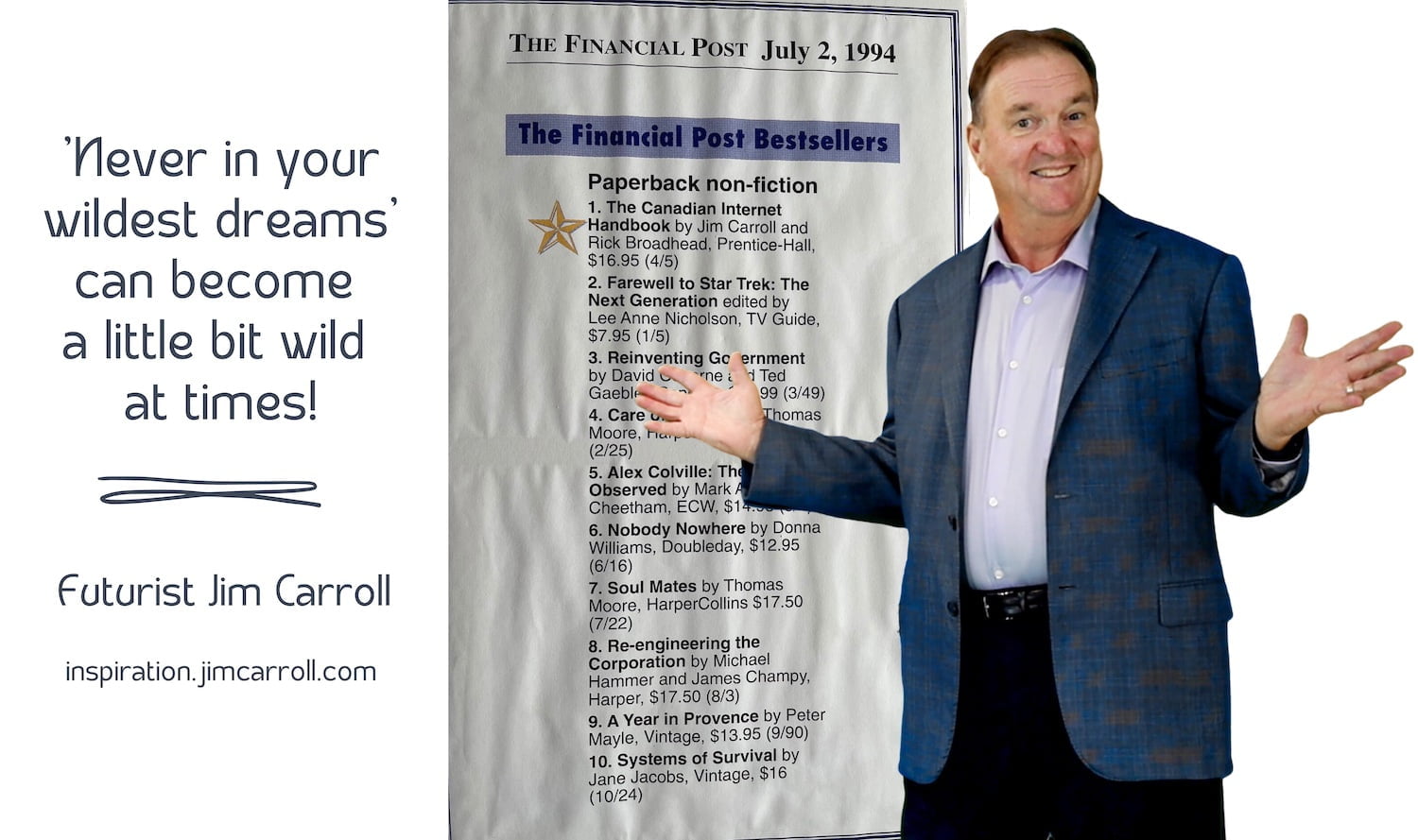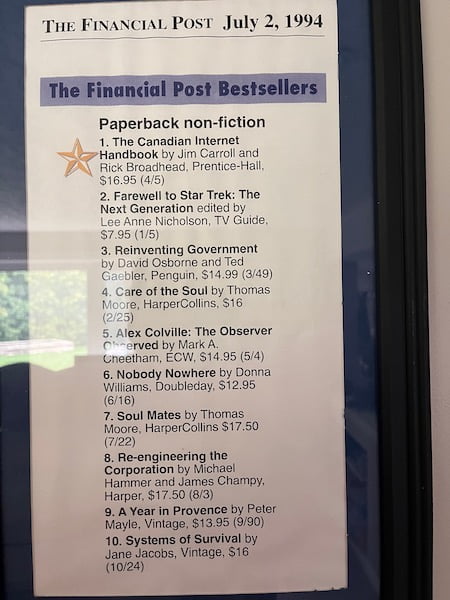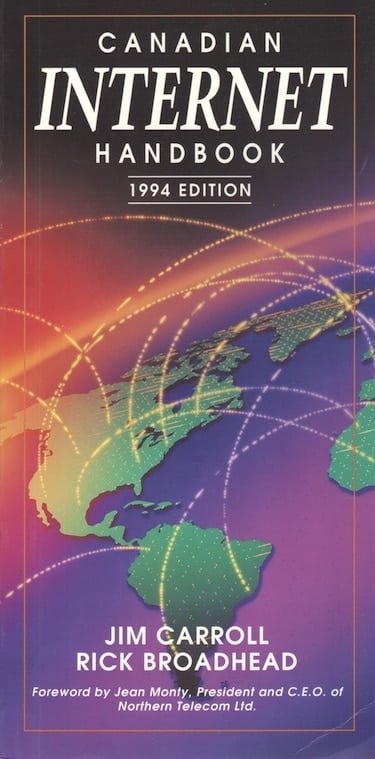“‘ ‘Never in your wildest dreams ‘ can become a little bit wild at times!” – Futurist Jim Carroll

It was 29 years ago yesterday when the wildest moment became pretty wild.
 I only happened to notice when I glanced at a picture frame I have on the wall in the home office and saw that the date lined up.
I only happened to notice when I glanced at a picture frame I have on the wall in the home office and saw that the date lined up.
I clearly remember that day – I had taken my young children off to the playground. When I came back, my wife Christa gently steered me into the kitchen towards the fridge, where she had placed the bestseller list from one of our national newspapers.
The fact is, we didn’t make just one bestselling book list – we also made that spot in the national Globe & Mail newspaper and were within that spot in both for about 12 or 14 weeks. it was a wild time, and a wild new career was born.
Everyone had told me that this little book project that i was involved in with my good friend Rick was doomed to fail. It would never sell, and would never amount to much. From that point, Rick and I went on to write 33 other books, involving the Internet and healthcare, business strategy and leadership, financial and money management, small business, and more. We even, for a number of years, had a ‘yellow pages’ type of project, selling tens of thousands of copies. There was a hunger for anything ‘Net related, and we were in the midst of the whirlwind in my home country of Canada.
I shared the story some years back in a post, “It was 20 years ago today”, and share it once again below.
it’s a heck of a story – and tells the tale that ‘never in your wildest dreams’ might always become a wild dream.
On March 6, 1994, a little book arrived from the printing company, was sent to our publisher, and a scant six weeks later, was the #1 best-selling book in Canada.
 My co-author, Rick Broadhead, and I went on to write some 34 books together over the next six years, selling more than 1.5 million copies, and our lives were forever changed.
My co-author, Rick Broadhead, and I went on to write some 34 books together over the next six years, selling more than 1.5 million copies, and our lives were forever changed.
Today, I find myself continuing a fascinating role as a futurist, with clients such as NASA, Disney, The GAP, and the PGA of America. I often find myself in shock and awe at how lucky I am to have had a career that has taken such a surprising and unexpected turn.
So it is also with my great and long-time friend. Rick is now one of the foremost literary agents in North America — with such deals under his belt as Wheat Belly (98 weeks on the New York Times Bestseller list!); The Disappearing Spoon, and astronaut Rick Hadfield’s An Astronaut’s Guide to Life.
It’s a remarkable story, and if you want to learn more, read on.
Every once in a while, you should reflect on where you are with your life, and be in awe of just how lucky you are.
I certainly do. Today is a milestone.
After the first book, Rick Broadhead and I went on to write 33 more books in the next six years. Life forever changed.
Then, like the Beatles, we had enough. We quit. We moved on and celebrated our success by establishing ourselves in the world.
20 years on, I find myself spending my time working with fascinating organizations — NASA! The GAP — the PGA! — around the world to help them understand the future. My co-author Rick has gone on to become one of the leading literary agents in North America. He has brought to print some of the most important books of our lifetime.
And it all just happened — just like that!
It’s a remarkable story, and in this day of instant news, celebrity, and instant everything, I am in awe to look back at how it unfolded.
May anyone who ever reads this story find themselves with such luck and coincidence.
Put it in context. It’s 1993. Social media would come 12 years later. The dot.com collapse was not even yet imagined! There was no YouTube, Facebook, or Twitter. The World Wide Web barely existed! It was the time of “Gopher”, “uucp”, “Archie”, and “Telnet”. BBS systems, 300-baud modems, and a mystery to connectivity. You had to be special to even figure out how to get in on the game. How to connect. How to sign in. How to become part of the magic that was to become the global idea-machine known as the Internet.
In that context, there was suddenly, in mid-1993, a sudden hunger by everyone to understand what was going on. Bookstores exploded with titles about “The Internet”.
Into this maelstrom and madness, I suddenly found myself with my good friend Rick Broadhead and my wife Christa Carroll.
It’s November 1993. I’m 15 years into the PC revolution at that point. I’m working in a home office, with a nice little business involving consulting around technology, connectivity, email — and writing a regular column for a technology publication about the Internet. Christa is a senior executive at the global powerhouse Unilever. We have a brand new son, Willie Carroll. Life is grand!
And then, three things happened all at once. The Internet exploded into public consciousness — it was all over the media — and books flooded the market: books like The Whole Internet Guide and Catalog by Ed Krohl. With that, an astute publisher at Prentice Hall Canada named Ken Proctor realized few of them had any Canadian angle, found me, and asked me if I could write that book. And just about then, I got an email from a young fellow named Rick Broadhead.
At the time, Rick was an MBA student at York University. What he told me in his email essentially was that he had gold — a list of organizations that could help you get onto the Internet — in Canada.
You have to realize in the context of the time how valuable this type of list was — this information did not exist anywhere. He also understood the Internet. So did I.
So I called Ken Proctor back and said we could do the book.
We got an advance of $2,500.
Boom! Within two months, Rick and I wrote the book. Christa took over with a brand new skill of editor, designer, constructionist – she worked the layout, and made it something that people could read. She and Rick debated for hours over how a particular section would work out – and together, they made it magical! We (they!) used Microsoft Word on Windows for Workgroups! (This was even before Windows 95!)
Christa typeset the thing. No one did this in 1993. No one ever, ever, typeset their own book. We were on a revolution!
And one day, we sent high-resolution pages to our publisher. Prentice Hall, ready for print. They really weren’t used to authors sending in type-set-ready copy. They worked on a schedule that would bring books out 9 months later. We had a full book in 8 weeks!!! Concept to print! Folks – just like that! Jeff Bezos hadn’t even invented Amazon.com yet, since there was really no Internet.
The first edition of the Canadian Internet Handbook went to print on February 20th, 1994.
It came back from the printer on March 7, 1994.
And in 6 weeks, it was the number-1 bestselling book on the national bookselling lists for the Globe & Mail and the National Post.
And then suddenly, it just got weird. You could not even begin to imagine what it is like to have your life go from “normal” to “fast” in an instant.
What would unfold over the next 5 years, even today seems indescribable. Rick and I were all over the media. National news appearances. Satellite trucks appearing in my driveway. Both of my sons would wake up in the morning, with TV crews tramping down the hallway to get into my home office, which was simply a bedroom upstairs, for a morning interview. Constant, incessant media coverage. Inches, pages, columns of ink. I would go on to have regular news columns with major newspapers, and airline magazines …
…. and suddenly both Rick and I found ourselves on stage. Describing to associations, global CEOs, executives, and kids, how this thing known as the Internet would revolutionize the world. We had a national radio show, NetTalk, describing how the Internet would change the world! In 1996, Rick and I were describing where our world would be in 2014. 2020. 2050.
Rick and I went to write more books. We helped the world to understand how it would change. Wow! We had it nailed!
Then the money flooded into the Internet. I think we both decided we did not want to be a part of it. Greed. Ugliness. Not s.
In March 2000, at the height of the dot.com hysteria, people were suddenly becoming millionaires — billionaires! — from the Internet. I remember the instant it all became clear. I was with Christa, Thomas, and Willie … driving to Washington for a vacation. Thomas and Willie were 7 and 5 years old.
I realized then that money didn’t matter – life did.
In 2001. the dot.com collapse happened. My newspaper column at the Globe & Mail was killed, because the publisher decided that was the end of the technology era. Rick and I stopped writing books. We had contract disputes with various publishers. Business models changed. We moved on, and both of us reinvented ourselves.
And 20 years later, all 3 of us are in awe. Magical times. You could not imagine!
Then came the next phase of the Internet….. revolutionizing the world, global politics, friendships, everything.
The point of this story?
Magic might happen in your life.
If it does, roll with it. It could always happen again!





GET IN TOUCH
Jim's Facebook page
You'll find Jim's latest videos on Youtube
Mastodon. What's on Jim's mind? Check his feed!
LinkedIn - reach out to Jim for a professional connection!
Flickr! Get inspired! A massive archive of all of Jim's daily inspirational quotes!
Instagram - the home for Jim's motivational mind!